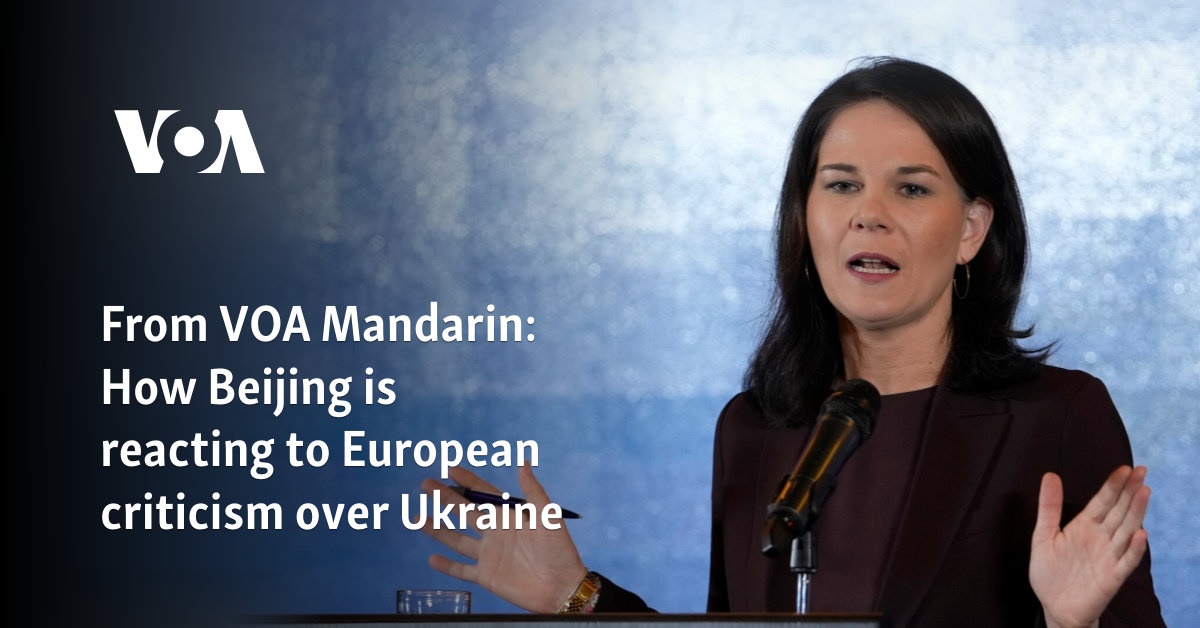Germany Walks a Tightrope: Balancing Condemnation and Commerce in China
This week, German Foreign Minister Annalena Baerbock embarked on a diplomatic mission to China, navigating the complex terrain of geopolitical tensions. While reaffirming Germany’s commitment to economic cooperation, Baerbock minced no words in criticizing China’s support for Russia amid its ongoing invasion of Ukraine.
She warned that “China’s economic and military support for Russia’s war against Ukraine” was directly undermining peace in Europe.
Despite these sharp criticisms, Baerbock also maintained a pragmatic tone, stressing Germany’s desire to protect its economic interests in key sectors like electric vehicles, climate, and security.
Baerbock’s visit has prompted analysis on the delicate balancing act she is performing. Experts note that Germany, like many Western nations, is grappling with the challenge of maintaining crucial economic ties with China while simultaneously condemning its actions on the world stage.
The muted response from Chinese officials to Baerbock’s pointed remarks has further fueled discussion. Some analysts suggest that Beijing is deliberately choosing a low-key approach to avoid escalating tensions with a key European partner, while others speculate that China may be quietly reassessing its stance on the Ukrainian conflict.
Whatever the reason, the visit sheds light on the intricate web of relationships that define the international landscape today. For Germany, the journey forward will likely involve a continued effort to reconcile its economic interests with its commitment to democratic values and global security.
“During a visit to China, she also pledged to stand up for Germany’s economic interests when it comes to electric vehicles, climate and security policy.”
“See the full story here.
A Balancing Act on the World Stage
Germany’s complex relationship with China is not unique. Many Western nations find themselves grappling with a similar conundrum: how to maintain economic ties with a rising global power while also challenging its authoritarian tendencies and assertive foreign policy.
Baerbock’s visit underscored the difficulty of this balancing act. On the one hand, Germany recognizes the importance of maintaining strong economic ties with China, particularly in sectors like automotive manufacturing and renewable energy.
On the other hand, there is growing unease in Germany and other Western capitals about China’s human rights record, its economic practices, and its increasingly assertive posture on the global stage. The war in Ukraine has further complicated the equation, raising concerns about China’s potential role in aiding Russia’s military efforts.
Reading Between the Lines: Decoding China’s Response
The muted response from Chinese officials to Baerbock’s criticisms has been the subject of much debate among analysts. Some experts see it as a sign that China wants to avoid jeopardizing its relationship with Germany, a crucial economic partner in Europe.
Others suggest that Beijing may be using a calculated approach, choosing to downplay the controversy while quietly reassessing its position on the Ukrainian conflict.
China has repeatedly called for a peaceful resolution to the war in Ukraine, but it has also refrained from directly condemning Russia’s invasion. This ambiguous stance has led to accusations from some Western officials that China is tacitly supporting Russia’s war effort.
Looking Ahead: Navigating a Shifting Landscape
Baerbock’s visit to China highlights the complex challenges facing the international community in the 21st century. As the global balance of power shifts, nations are forced to grapple with competing economic interests, security concerns, and ideological differences.
The outcome of this delicate dance will have profound implications for the future.
Will Germany and other Western nations be able to find a way to balance economic cooperation with their commitment to upholding democratic norms? Or will the current geopolitical tensions lead to a further fracturing of the international order?
Only time will tell. But one thing is clear: the world is entering a new era of uncertainty and complexity, and the choices made by nations like Germany will have a profound impact on the course of history.
Can Germany simultaneously condemn China’s actions while maintaining strong economic ties?
## Navigating the Tightrope: Germany’s Balancing Act with China
**Host:** Welcome back to the program. Today we’re discussing Germany’s recent diplomatic efforts in China, a visit marked by a careful blend of condemnation and commerce. Joining us is Dr. Sarah Miller, a leading expert on international relations. Dr. Miller, thank you for being here.
**Dr. Miller:** Thank you for having me.
**Host:** German Foreign Minister Annalena Baerbock travelled to China this week. Tell us about the key takeaways from this visit.
**Dr. Miller:** Baerbock’s trip highlighted the very real dilemma facing Germany, and indeed many Western nations: how to balance vital economic ties with China against growing concerns over its human rights record, its alignment with Russia, and its increasingly assertive foreign policy.
**Host:** We see this reflected in Baerbock’s strong criticism of China’s support for Russia in the Ukraine conflict, but also her emphasis on protecting German economic interests in key sectors like electric vehicles and renewable energy. Can Germany truly have both?
**Dr. Miller:** That’s the million-dollar question, isn’t it? Baerbock is attempting a delicate balancing act. Germany, like many European nations, is heavily reliant on the Chinese market.
But, as Baerbock stated, China’s support for Russia directly undermines peace in Europe [[1](https://www.auswaertiges-amt.de/en/aussenpolitik/regionaleschwerpunkte/


:max_bytes(150000):strip_icc()/ar-curtis-stone-getty-2x1-488ab072ac98497789a7af67d405d581.jpg)